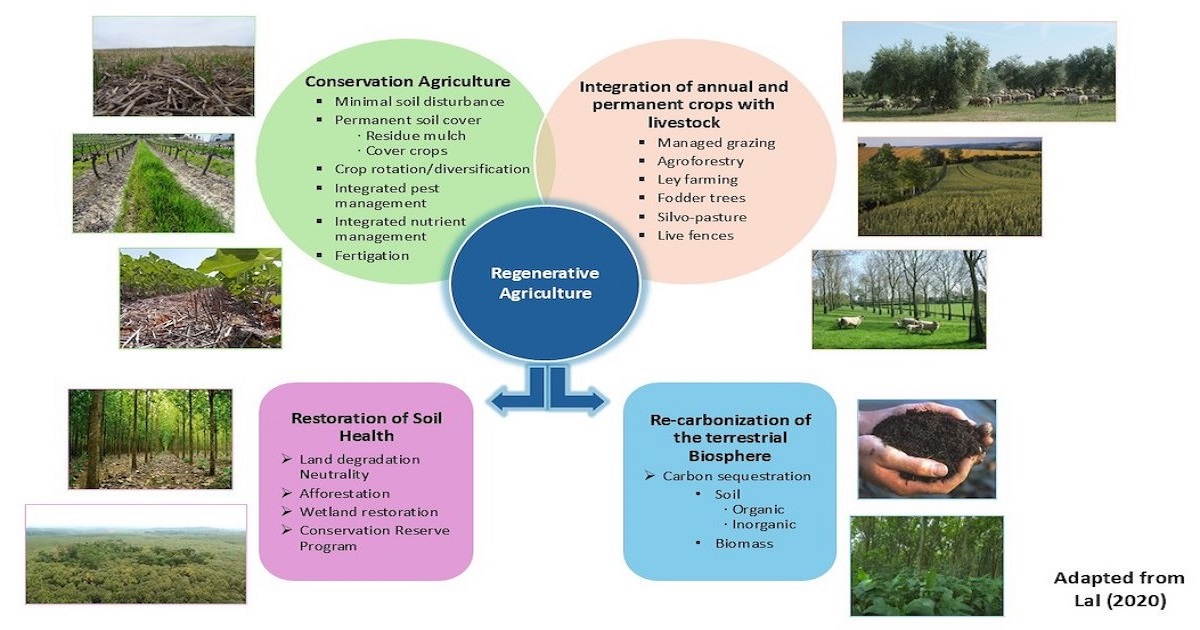Conservation-Regenerative Agriculture for Sustainable Agroecosystems
A special issue of Agriculture (ISSN 2077-0472). This special issue belongs to the section "Agricultural Soils".
Deadline for manuscript submissions: 30 November 2025 | Viewed by 624

Special Issue Editors
Interests: greenhouse gasses emissions; carbon sequestration; no tillage; circular economy; olive mill waste
Special Issues, Collections and Topics in MDPI journals
Interests: conservation agriculture; carbon sequestration; groundcovers; mulching; soil health
Special Issues, Collections and Topics in MDPI journals
Interests: climate change mitigation; conservation agriculture; sustainable mechanization; carbon sequestration; cover crops
Special Issues, Collections and Topics in MDPI journals
Special Issue Information
Dear Colleagues,
Around a third of the planet's soils are degraded. Water and wind erosion, soil compaction, loss of organic matter, salinization, acidification, contamination, and biodiversity loss are among the most concerning forms of soil degradation. In croplands, these threats can be compounded by unsustainable management. Practices like monocropping, excessive tillage, the overuse of fertilizers, and inadequate crop residue management diminish soil health. Current carbon concentration losses on cultivated land are estimated at around 0.5% per year, losing soil fertility and resilience rather than aiding in climate change mitigation.
To achieve sustainable agriculture, three dimensions of sustainability should be considered: environmental, economic, and social. Conservation agriculture has been demonstrated to achieve these sustainability’s dimensions by applying three interlinked core principles: minimal soil disturbance, permanent soil cover, and crop diversification. Regenerative agriculture aligns closely with these principles and goes further by explicitly incorporating livestock management.
Conservation and regenerative agriculture practices offer agronomically, environmentally, economically, and socially sound solutions for soil health rehabilitation. The benefits of these agri-environmental practices include improvements in organic matter, soil structure, water retention, soil fertility, mitigation, and adaptation to climate change, biodiversity, and resilience, among others.
The focus of this Special Issue will be to bring together advances in the application of conservation-regenerative agricultural practices for a sustainable agricultural sector which stop and reverse soil degradation while supporting long-term productivity, environmental sustainability, and economic viability. We welcome the submission of novel research, reviews, and opinion pieces these or related topics.
Dr. Rosa María Carbonell-Bojollo
Dr. Miguel Angel Repullo-Ruibérriz de Torres
Prof. Dr. Emilio J. Gonzalez-Sanchez
Guest Editors
Manuscript Submission Information
Manuscripts should be submitted online at www.mdpi.com by registering and logging in to this website. Once you are registered, click here to go to the submission form. Manuscripts can be submitted until the deadline. All submissions that pass pre-check are peer-reviewed. Accepted papers will be published continuously in the journal (as soon as accepted) and will be listed together on the special issue website. Research articles, review articles as well as short communications are invited. For planned papers, a title and short abstract (about 100 words) can be sent to the Editorial Office for announcement on this website.
Submitted manuscripts should not have been published previously, nor be under consideration for publication elsewhere (except conference proceedings papers). All manuscripts are thoroughly refereed through a single-blind peer-review process. A guide for authors and other relevant information for submission of manuscripts is available on the Instructions for Authors page. Agriculture is an international peer-reviewed open access semimonthly journal published by MDPI.
Please visit the Instructions for Authors page before submitting a manuscript. The Article Processing Charge (APC) for publication in this open access journal is 2600 CHF (Swiss Francs). Submitted papers should be well formatted and use good English. Authors may use MDPI's English editing service prior to publication or during author revisions.
Keywords
- soil degradation
- soil fertility
- soil organic matter
- no tillage
- cover crops
- crop rotation
- harvest residues
- managed grazing
- greenhouse gases emissions
- carbon sequestration
Benefits of Publishing in a Special Issue
- Ease of navigation: Grouping papers by topic helps scholars navigate broad scope journals more efficiently.
- Greater discoverability: Special Issues support the reach and impact of scientific research. Articles in Special Issues are more discoverable and cited more frequently.
- Expansion of research network: Special Issues facilitate connections among authors, fostering scientific collaborations.
- External promotion: Articles in Special Issues are often promoted through the journal's social media, increasing their visibility.
- Reprint: MDPI Books provides the opportunity to republish successful Special Issues in book format, both online and in print.
Further information on MDPI's Special Issue policies can be found here.





